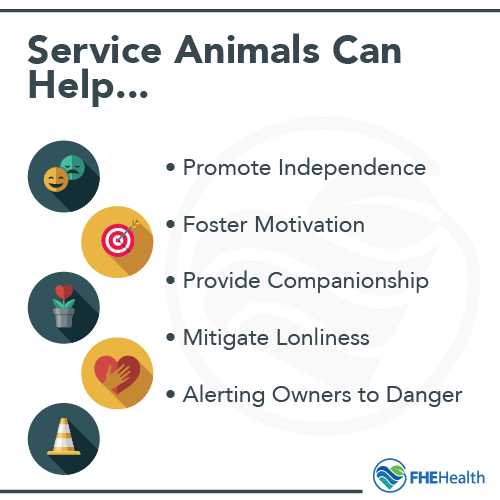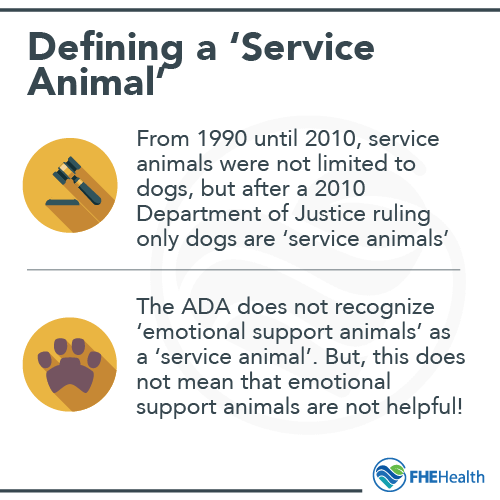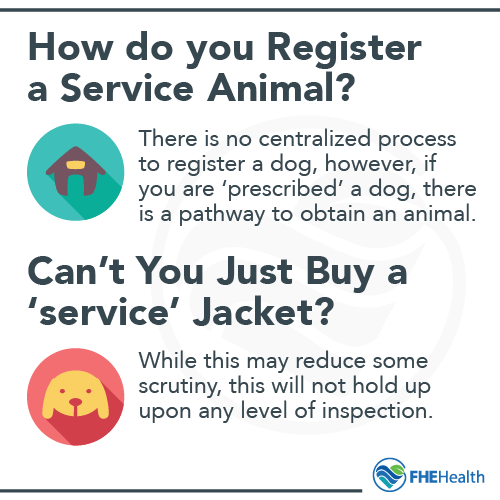
When an individual is recovering from addiction or a mental health disorder such as anxiety or depression, it’s normal for them to experience episodes of loneliness, fear, confusion, low self-esteem, lack of motivation and worry over the future. Robust treatment that includes rehab, psychotherapy, and support group participation provides participants with a lot of knowledge about their condition, but in some cases, further help is beneficial. For some individuals, therapy dogs or service animals are an important part of the journey to healing.
The Benefits of a Service Animal for a Mental Health Condition

Pet ownership is very common in the United States. In fact, according to data published by the Insurance Information Institute, about 67 percent of households have pets. It’s easy to see why: pets can be cute and cuddly and can help children learn valuable traits such as responsibility and empathy.
Owning a pet has also been shown to have distinct mental health benefits. Service animals are particularly helpful for family members living with mental health conditions such as anxiety, depression, and post-traumatic stress disorder (PTSD). For example, a service dog that’s trained to engage with someone who has bipolar disorder may help their owner cope with their condition’s roller coaster of emotional swings and provide reminders to eat, tend to personal grooming and take prescribed medications. Service animals also promote interactions that encourage socialization, which is important for everyone regardless of their mental health considerations.
In general, service animals and therapy dogs can help individuals with mental health conditions and disorders by:
- Promoting a greater sense of independence.
- Fostering motivation.
- Bolstering a desire for self-improvement.
- Providing companionship.
- Increasing confidence in social settings.
- Alerting their owners to potential dangers.
- Pulling or pushing them out of harm’s way.
- Serving as reminders for health-related actions.
- Mitigating isolation and loneliness.
Psychiatric service dogs, and service dogs in general, must be individually trained to meet their handler/owner’s specific needs. For example, they can be trained to:
- Guide someone who’s disoriented.
- Help the person who panics in a crowd find an exit or family member.
- Do a room search to alleviate hypervigilance in someone with PTSD so they can safely enter.
- Signal during fire alarms, weather alerts or other sounds.
- Re-direct or interrupt an obsessive-compulsive disorder (OCD) behavior.
- Provide balance assistance to someone in panic or on strong prescription medication.
- Bring medication.
- Get outside help.
- Identify hallucinations.
In addition, service dogs can help relieve depression symptoms by compelling the depressed person to get out of bed and move around.
A recent study conducted in Australia observed the positive impact that service animals had on their handlers. Of the study’s participants, 84% were diagnosed or self-diagnosed with depression, 62 percent were living with PTSD, 57 percent experienced panic attacks, 64 percent had social anxiety and 60 percent had generalized anxiety disorder. The study also represented individuals living with less common conditions, including those with obsessive-compulsive disorder or eating disorders and those on the autism spectrum.
The psychiatric service dogs performed a number of tasks for their owners:
- Anxiety reduction through tactile stimulation (94 percent).
- Bringing the owner back to the present through nudging or pawing (71 percent).
- Interrupting a behavioral state that’s undesirable (51 percent).
- Maintaining constant body contact (50 percent).
- Stimulation through deep pressure (45 percent).
- Blocking contact from other individuals (42 percent).
The psychiatric service dogs in this study were trained by either the owner or a qualified trainer and owner. None were exclusively trained by assistance/service dogs provider organizations.
- Anxiety reduction through tactile stimulation (94 percent).
- Bringing the owner back to the present through nudging or pawing (71 percent).
- Interrupting a behavioral state that’s undesirable (51 percent).
- Maintaining constant body contact (50 percent).
- Stimulation through deep pressure (45 percent).
- Blocking contact from other individuals (42 percent).
The psychiatric service dogs in this study were trained by either the owner or a qualified trainer and owner. None were exclusively trained by assistance/service dogs provider organizations.
What Defines a Service Animal?

When the Americans with Disabilities Act (ADA) passed in 1990, service animals weren’t limited to dogs. At that time, service animals could be from other species and could include miniature horses, pigs, and even monkeys.
However, the Department of Justice amended the ADA in 2010 to specify only dogs could be used as service animals, stating, “other animals, whether wild or domestic, do not qualify as service animals.” Under certain limitations, though, the final rule permits using trained miniature horses as an alternative to service dogs.
According to the ADA, a service animal “is defined as a dog that has been individually trained to do work or perform tasks for an individual with a disability.” Furthermore, the task or tasks the dog performs “must be directly related to the person’s disability.” This includes a physical or mental health disability that interferes with or prevents the individual from performing daily activities.
It’s important to note that while someone with depression may have a psychiatric service dog trained to help them adhere to their medication regimen or other tasks, the final rule states that dogs that are “used purely for emotional support, are not service animals.”
Still, emotional support animals serve a useful purpose for many people who don’t qualify for a service animal but benefit from the comfort and companionship of these animals.
Can You Register Your Pet as a Service Animal?
Since the requirement for service animal designation involves special training to perform a task for the person with a disability, a pet dog already in the household usually cannot be trained as a service dog. Service dogs, then, differ from regular pets due to their specialized training, which takes about two years.
These requirements make it unlikely that someone would be able to have their pet trained or registered as a service animal. However, as the study of psychiatric service dogs in Australia noted, owning non-service-trained pets has profound benefits for mental health.
What Are the Benefits of Having a Service Animal?
Service dogs typically help individuals with visual, hearing, or mobility impairment. However, they also benefit those with mental health conditions such as depressive disorders, anxiety disorders, bipolar disorder, schizophrenia, and PTSD.
In the context of the ADA and an individual’s right to a service animal, “disability” isn’t a medical term but legal term. It’s defined as a physical or mental impairment that limits one or more major life activities, such as an individual’s ability to tend to their own nutritional or hygiene needs. Some disabilities are clearly evident; for example, the individual may rely on mobility aids. Other disabilities are invisible, such as diabetes or mental illness.
Depression
The benefits of service dogs are evident for those with severe depression that impacts their ability to care for themselves. Service dogs can be trained to get medication and water for the individual when they’re unable to get up and even remind the individual to take their medication by nudging them until it’s done. They can also be trained to call 911 or a suicide hotline on a K9 Rescue Phone if their handler experiences a severe bout of depression.
Anxiety
For those living with anxiety disorders, a service dog can provide reassurance and help create a safe space. For example, a service dog whose handler experiences panic attacks when they’re in a crowded space can lead them to a quieter place or serve as a buffer between them and other people. They can ground the individual when they’re experiencing an attack and help them return to the here and now.
Bipolar Disorder
Bipolar disorder is associated with significant mood shifts, taking the individual from states of euphoria and boundless energy to deep depression. For those living with bipolar disorder, service dogs can disrupt emotional overload and help bring a sense of calm. They can also bring medications and water to swallow pills with when the individual is unable to get it for themselves.
Schizophrenia
Schizophrenia is a disruptive disorder that’s often associated with disturbing hallucinations. To help their handlers cope with these hallucinations and stay grounded in reality, service dogs can be trained to stay close and serve as a shield between the individual and their hallucination. They can also disrupt self-harming behaviors such as cutting.
PTSD
PTSD is common among those who’ve experienced severe trauma such as abuse, assault, or situations in which the individual’s survival is threatened, such as exposure to combat. Service dogs can help those with PTSD by waking them when they’re experiencing nightmares or helping to reduce fears when they’re exposed to triggers. Service dogs can also be trained to turn on lights or do room searches, helping the individual feel safe when entering a room or building.
Service dogs that are used by individuals with mental illnesses are generally referred to as psychiatric service dogs. Unlike emotional support animals or therapy dogs, psychiatric service dogs are recognized as service animals by the ADA. These dogs are trained to recognize their handler’s disability and respond through specific tasks. Under the ADA, psychiatric service dogs are protected the same as guide dogs and are allowed to accompany their handler at all times.
The Benefits of Owning Therapeutic Pets
Those who don’t qualify for a psychiatric service animal may still want to get a therapeutic pet. Pets for anxiety, for example, can fill an important need even if they’re not actually mental health service animals.
According to a study published in Frontiers in Psychology, the activation of the oxytocin system plays a key role in a number of beneficial physiological and psychological effects. This chemical release has profound benefits for an individual living with a condition such as depression or anxiety. Interacting with pets can trigger this hormone response, providing advantages such as:
- Improving social contact, quality of life, mood, and symptoms in those with chronic schizophrenia participating in dog-assisted therapy.
- Reducing depressive symptoms in elderly residents in a nursing home with a resident dog.
- Reducing self-reported anxiety and fear.
- Improving physical and mental health.
Who Licenses/Registers Service Animals?
No centralized process exists in the United States for those with mental illnesses to legally register a service dog and take it on planes and into public places. The DOJ’s regulations, however, allow them the privilege of doing so, provided that the dog has specific training to perform tasks relating to the owner/handler’s disability. Processes and policies vary by state. California, for example, offers free registrations for assistance animals that eliminate the need for licensing.
Where do you obtain service animals? How to find a psychiatric service dog? Get a prescription from a mental health professional or medical doctor. Look for provider organizations for these service animals. In the United States, Assistance Dogs International (ADI) and the International Guide Dog Federation (IGDF) are two accredited facilities training service dogs. Non-accredited facilities are more often likely to use shelter dogs and assist people to train their own dogs.
What are the Benefits of Getting a Service Animal Registered?
It’s more of a quality assurance benefit to get a service animal certified or registered. Certification is not required by U.S. law, but those who have service animals under the ADA will likely be provided with a certification of the dog
Does a Service Animal Need to Be Registered?
If an individual buys a service jacket online, it’s likely worthless. The only correct way to obtain service animal certification (not registration) is to go through a legitimate training organization or trainer that trains a dog as a service animal. The organization or trainer issues a certificate or identification card that verifies that the animal meets ADA requirements. Accredited organizations and trainers also certify that the individual and their dog meet the ADA’s standards for consideration as a qualified service dog team.
Animals in Therapy
Mental health pets not only help at home but may also be part of a program. While they’re not personal pets that live in an individual’s home permanently, they may sit or interact with a client during therapy appointments. The most recognized animals in therapy are therapy dogs and therapy horses.
Animal-assisted therapy can improve treatment outcomes in psychological disorders and can be used along with other types of psychotherapy, according to a study published in Advances in Mind-Body Medicine. A pilot study in Frontiers in Veterinary Science found that short-term dog-assisted intervention involving soldiers with PTSD improved their mental wellness, “particularly regarding the ability to experience joy.”
A study published in the Journal of Traumatic Stress found that equine-assisted therapy may be effective in treating symptoms of anxiety and PTSD. Another study in Military Medical Research found that therapeutic horseback riding helped military veterans with PTSD by significantly decreasing their PTSD symptoms, which include emotional numbing, anxiety, and flashbacks.
Therapy animals can have a significant impact on the individual’s quality of life, whether or not they’re officially registered as service animals. Even household pets without formal training can provide a calming presence and help their owners establish healthy habits, enjoy a sense of purpose, and give and receive affection.






